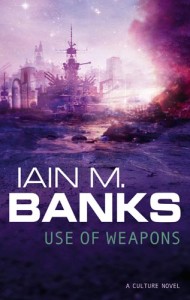 Use of Weapons, by Iain M. Banks
Use of Weapons, by Iain M. Banks
Synopsis: A series of shorts taking place during lulls in violent conflicts, examining the banality and futility of war, of redemption.
Book Review: Technically there are two storylines in this book, my synopsis only covers the important one, which is told in reverse. The normal-progressing storyline is too long, and drags in many points. The two storylines are interwoven, and thus the chapters alternate between them, but the book would have been better served if two-thirds of the forward-progressing story had been cut. I suspect he felt the same, because Banks’ prose never rose from the page in those sections. I could see the right words being used, in the right order, but somehow the descriptions never kindled my imagination, the world never drew me in. I put this criticism up front, because the meat of the novel is mind-blowingly awesome.
The reverse-order storyline is incredible. Every single story is purified, concentrated shot of isolation, disassociation, or resignation. A silent, screaming, desperate pleading for purpose, or forgiveness, or ending. The journey is slow in places, but the payoff is amazing. Banks’ use of reverse structure is phenomenal, and we all know how much I love structure-play (so much that Vellum is my favorite book ever). Even better – the story could not be told if he had used the traditional structure. His use was not only well-done and very aesthetically fulfilling, it was necessary due to the story he was telling. I know I’m decades late to the party, but – Highly Recommended.
Book Club Review: Also a stellar book for a book club. There are several themes that run deeply in this book which afford great exploration in conversation. The titular “Use of Weapons” is a rephrasing of the question “what means are justified by the ends?” What weapons are you willing to use in order to achieve a greater good? Is the horror of war justified if it leads to a better world? What atrocities can be overlooked for victory? The question is repeated over and over in dozens of forms – Should we retreat from this area, which holds a sacred temple but is indefensible, in order to win the war? Should I leave dozens of people disfigured to escape with a diplomat who can avert the next war? Banks goes from the broad strokes and focuses down to the extremely small – a single person, a single relationship – to really bring home the question and truly make it personal. Are these means justified by the ends? He even manages to make the ends abstractedly good by never telling you why the people at war are fighting. The protagonist is convincingly shown to be a deeply good and deeply caring person. His guilt and quest for redemption consumes his entire existence for decades, maybe centuries, yet he never repents his original act. This really drives home that what he was fighting for was, at least in his mind, the greatest of all causes. We are not told what it is, and so we insert our own dreams, our own most holy values, and ask… what weapons would we use to defend them?
Highly Recommended.